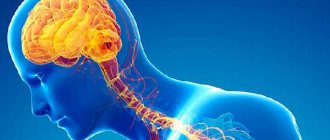Signs and symptoms of Alzheimer's disease
Severe symptoms of Alzheimer's disease appear gradually.
In most cases, memory impairment is the first sign of dementia, but it is far from the only one:
- Memory deterioration: the patient does not assimilate new information, repeats himself when speaking, is forced to use diaries, organizers and notebooks to memorize;
- Inability to cope with everyday affairs: a person loses skills in interacting with household appliances, is unable to perform basic arithmetic operations (addition, subtraction);
- Difficulties with spatial and temporal orientation: the patient does not recognize his location, is not able to name the current time of year, day of the week, month, time of day;
- Impaired visual perception: the patient is unable to calculate the distance from himself to an object, is constantly exposed to the threat of injury from a blow or fall, sees a “stranger” when looking in the mirror;
- Lack of memory of completed actions: the patient constantly loses things, does not remember where the necessary items are. Related to this are the accusations of theft and deceit that Alzheimer's patients often make against those around them;
- Difficulties in communication: a person is not able to find the right words, confuses the names of things (for example, replaces the word “felt-tip pen” with the phrase “subject for drawing”), forgets about the topic of the conversation in the midst of it;
- Refusal of hobbies: the patient loses interest in activities that once fascinated him, completely abandons them;
- Mood fluctuations: the patient exhibits hypertrophied distrust, falls into confusion, demonstrates indifference or excitement, plunges into depression, ignoring what is happening around him;
- Neglect of personal hygiene: a person completely ignores the need to brush teeth, take a bath and perform other hygiene procedures. If no one takes care of it, it takes on a sloppy appearance;
- Inability to choose and make decisions, loss of financial skills.
The development of the symptoms listed above can take several years - the exact sequence of their appearance is difficult to determine. Initially, the patient and those around him mistake the warning signs for fatigue and age-related memory impairment, but the signs of illness become more pronounced. As a result, a person who develops Alzheimer's disease becomes unable to care for himself. It cannot be left uncontrolled for a long time, since “forgetfulness” and other disorders pose a threat to life and health - for example, a patient leaves a gas stove on.
Prevention
To date, there are no clear preventive prescriptions. Experts suggest that regular intellectual stress, as well as adjustments to provoking factors, can prevent rapid pathology:
- control of sugar in the body and blood pressure;
- proper nutrition;
- complete cessation of bad habits.
Thus, in order to exclude the causes of Alzheimer's disease and reduce the rate of development of the disease, it is recommended to stimulate thinking and exercise.
You can help your relative by placing him in a specialized institution. The network of boarding houses "Zabota" offers comfortable conditions to improve the quality of life, round-the-clock monitoring and support of its residents, and medical care.
There are 10 branches to choose from in different regions of Moscow. Each of them is adapted to accommodate the elderly and Alzheimer's patients: there are staff call buttons and elevators, and bathrooms are designed for pensioners. The boarding houses have large areas for relaxation and walking, and host leisure and entertainment events.
Sources
:
1 Alzheimer's disease.
https://ru.wikipedia.org/wiki/Alzheimer's_Disease
2 Alzheimer's disease: etiology, pathophysiology, clinical manifestations, diagnosis, prognosis, treatment, prevention.
https://www.msdmanuals.com/ru/alzheimer's disease
3 Treatment strategies for Alzheimer's disease. Natural approach.
https://ru.iherb.com/a-natural-approach-to-alzheimers/246
4 Does the Bredesen Protocol treat Alzheimer's disease?
https://medfront.org/recode-bredesen/
5 News: “The Bredesen protocol is presented in Russia.”
https://medvestnik.ru/V-Rossii-predstavlen-protokol-lecheniya-bolezni-Alcgeimera-po-metodu-Deila-Bredesena
Causes of Alzheimer's disease
Modern medicine attributes Alzheimer's disease to a multifactorial nature, citing heredity as the main cause. There are also other risk factors, which are divided into non-correctable, conditionally correctable and correctable.
Non-correctable factors
This group includes genetic or acquired characteristics of the patient’s body, as well as a number of life events:
- Age over 65 years (research results in this area show that of all people who celebrated their 90th birthday, signs of dementia are present in 42%);
- Being female (women are more likely to experience the disease, which has not yet been fully explained by medicine);
- Suffering from severe depression, deep psychological shock;
- Receiving a traumatic brain injury (this category also includes injuries acquired in infancy or during childbirth);
- Lack of full-fledged intellectual activity (the entire life period is considered);
- Low level of education (graduation from a university is a positive factor).
Conditionally correctable factors
This group includes various disorders that can lead to oxygen starvation of brain cells:
- Diseases of the cardiovascular and respiratory systems, causing general oxygen deficiency;
- High concentration of lipids in the blood;
- Atherosclerosis of the vessels of the neck and head;
- High blood pressure;
- Diseases associated with excessive concentrations of glucose in the blood (for example, diabetes mellitus).
Timely treatment makes it possible to eliminate the factors of this group that “push” the body to develop Alzheimer’s disease.
Adjustable factors
This group includes threats that a person can cope with on his own, only by making changes to his lifestyle and being closely involved in his health:
- Lack of physical activity;
- Excess weight;
- Lack of intellectual activity;
- Addiction to alcoholic beverages, smoking;
- Excessive love for drinks containing caffeine.
So is Alzheimer's disease inherited or not?
Let's take a closer look at the main features of this disease. Disease
Alzheimer's triggers degenerative processes in the nerve cells of the brain, which causes disruption of the functionality of this organ. The patient's condition will gradually only worsen. At the same time, the negative changes that have occurred will ultimately become irreversible. As a rule, after diagnosis, people live about 7 years, but this is a very average figure. One point should be taken into account. Often several years pass between the appearance of the first signs of the disease and the diagnosis.
If we talk about the heredity factor, then it should be noted that doctors really paid attention to one fact. Most patients diagnosed with Alzheimer's disease had relatives with the same pathology in previous generations
This is also indicated by medical statistics. Accordingly, it should be stated that Alzheimer’s disease is indeed inherited.
As you know, a child receives 23 chromosome pairs from his parents. Each gene contains information about the structure of the human body. Under the influence of certain factors, they can change, that is, mutate. Because of this, a number of pathologies develop, including Alzheimer’s disease. According to scientists, heredity and this disease are closely related.
Moreover, it is now even known which chromosomes are responsible for the development of Alzheimer's disease. These are, in particular:
- first,
- fourteenth,
- nineteenth,
- twenty first.
Both types of pathology can be inherited. In the first, the disease develops at an early age - approximately 30-40 years, while in the second, the pathology appears in much older people. At the same time, scientists argue that the changes that have occurred in the gene structure are far from the only reason for the appearance of this disease in humans. The risk increases significantly in the presence of contributing factors. These, for example, include the environmental situation in the area of residence, as well as a person’s lifestyle.
In other words, the disease can indeed be inherited. However, the presence of a person in the family with Alzheimer’s disease does not mean that the pathology will necessarily appear in a representative of the younger generation. In this case, we need to say that it is not the disease itself that is transmitted. A person inherits only a set of genes that contribute to its development. Moreover, there are 2 types. The first of them provokes the development of the disease at a young age. This genotype is an almost 100 percent guarantee that the disease will be inherited by the younger generation. However, this set of genes is very rare today.
No less important in this aspect is a positive emotional background. It is necessary to avoid stressful conditions as much as possible, learn to think positively and look at life with optimism. Communication with like-minded people can be very useful in this regard. It is also recommended to give up bad habits - smoking, drinking alcohol, drugs. After all, they can also be a factor contributing to the development of the disease. And, of course, don’t forget about the benefits of physical and mental exercise. The main thing is that they are not excessive, since you also need to allocate the appropriate time for rest, otherwise the body will sooner or later fail.
Stages of Alzheimer's disease
Studies have shown that degenerative processes occur in the human brain long before the onset of discernible symptoms of Alzheimer's disease - on average, 15-20 years. This factor creates difficulties in accurately determining the clinical onset of the pathological process and complicates the early diagnosis of dementia.
Until a few years ago, medicine considered only the stages marked by obvious symptoms of Alzheimer's disease. However, early initiation of treatment can significantly slow down the destructive process and stop the formation of a pronounced clinical picture of the pathology.
As a result, the number of stages of Alzheimer's disease increased to 7 due to the early stages:
- First stage: there is no memory impairment, no signs of pathology. Examination of the patient does not show abnormalities typical of dementia.
- Second stage: the deterioration of mental processes is insignificant, alarming signals are seen only by the patient himself. Physiological memory impairment (caused by aging of the body) should not be confused with early symptoms of pathology.
- Third stage: memory deterioration becomes moderate, the problem is noted by other people. A person does not remember the location of things, makes mistakes with the names of others, takes a long time to choose words when communicating, and becomes absent-minded. During the examination, the doctor discovers memory impairment, but cannot yet make a final verdict - Alzheimer's disease.
- Stage four: memory deterioration is obvious. The patient confuses the names of relatives and friends, does not remember events from his life, and cannot cope with arithmetic calculations (for example, he is not able to count backwards from 10 to 1). A person experiences stiffness, a desire for solitude, and difficulty making choices.
- Fifth stage: the patient forgets his own place of residence, cannot give his telephone number, does not determine the time of year, day of the week and date, and does not dress for the weather. Recognition of relatives is preserved, as is the memory of bright moments from one’s own life. The ability to go to the toilet and eat independently is also preserved.
- Sixth stage: memory deterioration progresses, the patient does not remember the names of relatives and friends (although he recognizes them visually), a significant period of his biography “disappears” from his life, sleep disturbances appear (night wakefulness, daytime sleep), urinary incontinence, problems with stool. The patient is no longer capable of independent (separate) living and loses the skills of choosing clothes. A person develops distrust of others, complains of deception, theft, and hallucinations are not excluded.
- Stage seven: the patient is unable to move, sit without help, loses speaking skills (or reproduces individual phrases or words), and the ability to swallow food (refusals of food and water are possible). Such a patient cannot be left without control - he needs support when visiting the toilet, dressing, and feeding. This stage is the most severe, there is a danger of contracting infections, the threat of pneumonia, pyelonephritis.
The allocation of stages is conditional, since different patients have different manifestations of Alzheimer's disease, and the rate of its development differs.
Can the disease be inherited?
Doctors, conducting examinations of patients with an identified disease, noticed that such people had relatives with similar signs of the pathological process. Therefore, a large number of research works confirm the proposition that Alzheimer's disease can and is most often transmitted by heredity
High probability of heredity
Moreover, if a disease is detected in one relative in a family, then in the next generation there is a possibility that the disease will manifest itself in much larger quantities. Therefore, all data and examinations carried out during the development of a pathological process in the brain confirm that senile insanity is transmitted at the genetic level.
When a child is formed, a set consisting of 23 chromosomes from the father and mother is incorporated into the structure of its tissues and internal organs. The baby receives all the inclinations and habits from both parents. Under various circumstances, a pathological process develops in which a gene undergoes a mutation procedure.
Those people who are in direct contact with a sick person, be it a parent or sibling, are recommended to undergo an examination and pass a special test for the presence of developing signs of pathology. If you find any results, you should consult a doctor.
To prevent the development of the disease, even if there is a direct relative, it is recommended to carry out a number of preventive measures:
Healthy foods
- Drive away bad thoughts from yourself, perceive life positively in bright colors.
- Avoid stressful situations.
- Protect your own body from the toxic influence of external factors.
- To refuse from bad habits.
- Develop intelligence, constantly stimulate brain activity.
- Eat only proper, balanced foods.
- Communicate with pleasant and educated people.
There is nothing better for preventing problems than a full life, quality rest, staying with family, loved ones and loved ones.
Diagnosis of Alzheimer's disease
If signs of Alzheimer's disease are detected, you should immediately visit a neurologist. Before visiting a doctor, the patient must psychologically prepare for many mandatory questions. The survey allows the specialist to understand the nature of the complaints, the development of disorders, the presence of risk factors and make a preliminary verdict. The results of a thorough examination and interview help rule out an alternative diagnosis.
Neuropsychological tests
Neuropsychological testing is a mandatory part of the examination of a patient who has symptoms of Alzheimer's disease.
Their conduct allows us to detect violations of a number of cognitive functions:
- Speeches;
- Intelligence;
- Perceptions;
- In memory.
Intelligence testing allows you to test the patient’s ability to analyze information, separate the secondary from the important, the particular from the general, and understand differences and similarities. The patient’s ability to construct logical chains is also checked.
Perception testing is useful in the absence of pronounced symptoms of pathology and allows it to be detected at the initial stages. Dementia is suspected if a person is unable to name four objects shown on paper.
Memory testing involves testing the ability to remember words, gestures, and drawn elements. Most often, “auditory” memory testing is carried out, the results of which assess the ability to fix sentences and words in memory.
Combined testing is a simultaneous study of the level of intelligence and memory. The advantage of this technique is the ability to distinguish initially poor memory from manifestations of Alzheimer's disease.
Testing for depression. The rapid test allows you to refute the suspicion of hidden depression, the symptoms of which in some cases are mistaken by victims for symptoms of dementia.
Laboratory research
A blood test is done to detect risk factors that contribute to a person developing Alzheimer's disease. The study allows you to evaluate glucose, lipids, and cholesterol levels. Also, at the stage of absence of pronounced manifestations of pathology, a valuable contribution to the diagnosis is made by the study of cerebrospinal fluid. This procedure allows us to identify specific markers of the degenerative process.
Neuroimaging methods
The following neuroimaging methods exist:
- PET-CT (positron emission tomography with contrast) can detect traces of amyloid formations in the brain, assess metabolic activity, check blood flow and the location of specific receptors in the brain tissue. The technique is an effective early diagnostic tool that allows you to detect a pathological process in the absence of pronounced symptoms. Its use is not available if the patient has high blood sugar or other contraindications to PET-CT;
- MRI (magnetic resonance imaging) allows you to examine brain tissue in great detail and refute other disorders. The procedure provides information about the structure of brain tissue, its deep layers and functioning;
- CT (computed tomography) is performed in the absence of severe symptoms and is a tool for differential diagnosis (the results confirm or exclude other diseases with similar symptoms);
- EEG (electroencephalography) checks the activity of brain cells. The technique is not used to diagnose pathology at the initial stage, but effectively refute other diseases;
- SPECT (single photon emission tomography) can detect abnormalities that are characteristic of Alzheimer's disease. The test examines certain brain functions and evaluates blood flow in the brain.
Causes
The factors that cause dementia remain a mystery, and until now scientists have not determined the exact cause that gives rise to the development of the disease. What is known for certain is that metabolic processes in the cerebral cortex are disrupted in humans. Because of this, there is an accumulation of harmful substances - beta-amyloid (senile plaques) and tau protein.
The above assumptions became the basis of three theories that explain the etiology of the development of pathology.
- The cholinergic hypothesis states that dementia begins to form due to a decrease in the synthesis of acetylcholine, which is responsible for transmitting the corresponding impulses from the cerebral cortex to muscle structures. The hypothesis has been criticized due to the fact that restoring the level of the main substance in the human body does not prevent the development of pathology.
- The amyloid hypothesis insists that the cause of tissue degeneration begins with the deposition of beta-amyloid peptides. They perform a protective function. When the metabolic process is disrupted, beneficial substances turn into components that cause harm.
- The Tau theory considers the sequence in a chain of disorders associated with deviations in the structure of the tau protein, which begins to exhibit unusual functionality and destroys neurons.
We should not exclude a genetic predisposition: if one of the close relatives had such a diagnosis in their anamnesis, then there is a high probability of its occurrence in the heir.
Expert opinion
Author: Georgy Romanovich Popov
Neurologist, Candidate of Medical Sciences
Alzheimer's disease mostly affects older people over 65 years of age. The older a person is, the higher the chance of developing this disease. Up to 40% of the victims are in the age group from 80 to 85 years. This type of dementia is degenerative and cannot be cured. The process of destruction of brain cells will soon manifest itself in the form of dementia, and self-medication without a professional examination can worsen the situation.
It is not possible to diagnose the disease yourself at an early stage. And delaying going to the doctor can negatively affect the patient’s condition due to the high rate of development of this type of dementia. To accurately determine the diagnosis, it is necessary to use special equipment and consult neurologists. Specially prepared tests will help establish the causes of the disease and formulate the optimal course of treatment. Such conditions are offered by the Yusupov Hospital. High-quality care from leading doctors will help curb pathological processes, which will give the patient the opportunity to lead a normal life.
How to cure Alzheimer's disease?
Treatment for Alzheimer's disease is aimed at slowing the progression of the pathology and reducing or eliminating the symptoms present. Timely initiation of treatment increases the chances of saving the cognitive abilities of the brain.
At the moment, medicine does not have drugs that ensure complete recovery of the patient. Only means are offered, the use of which mitigates human suffering.
Pharmacological drugs
Treatment of Alzheimer's disease with medications aims to restore the patient's intelligence and memory.
There is also a fight against the typical symptoms of the pathology - depression, excitability, and the appearance of hallucinations:
- Cholinesterase inhibitors are the basis on which drug therapy is built. The pathology is caused by a deficiency in the body of a substance that controls the ability to remember – acetylcholine. The drugs slow down the destruction of this amino acid and lead to its accumulation. The development of the disease in the initial and middle stages is effectively stopped by rivastigmine and galantamine. Donepezil is prescribed for severe cases. If the dosage prescribed by the doctor is observed, most patients easily tolerate the therapy;
- Memantine is another drug actively used in the treatment of Alzheimer's disease. The pathology leads to a high concentration of glutamate, which leads to damage to the cerebral cortex. The drug allows you to reduce the intensity of the destructive effects of glutamate and increases the period during which the patient is able to care for himself. Basically, the medicine is used in the diagnosis of moderate and severe stages, the decision can only be made by a doctor;
- Psychotropic drugs are prescribed to the patient if he has such common manifestations of the disease as depression and sleep problems. Antipsychotics and tranquilizers help alleviate or eliminate symptoms. Medicines are not prescribed if the above signs of Alzheimer's disease are absent or practically not manifested;
- Tranquilizers allow you to relieve or soften emotional stress without affecting the thought process and memory functionality. The drugs also produce a relaxing effect and are anticonvulsants. The appointment requires strict adherence to medical recommendations, as there are side effects;
- Neuroleptics are prescribed for psychopathic conditions, but can intensify the manifestations of dementia;
- Antidepressants are necessary to relieve the patient of chronic anxiety or apathy;
- Antioxidants have a positive effect on hemodynamics and microcirculation. With their help, the period during which the patient can care for himself increases.
On the subject: Treatment methods for Alzheimer's disease
Non-drug remedies
Drug treatment is necessarily complemented by psychosocial treatment; the following methods are practiced:
- Cognitive;
- Emotional;
- Stimulating;
- Behavioral.
An integrated approach based on the above methods ensures a reduction in the intensity of manifestations of Alzheimer's disease and an improvement in the patient's condition. In some situations, it is even possible to partially restore abilities lost as a result of the development of pathology and restore a person’s ability to at least partially self-care. Art therapy, music therapy, sessions of therapeutic contact with animals (pet therapy) and many other practices are used.
Diet food
Diet for a person affected by Alzheimer's disease is almost as important as pharmacological medications. The correct choice of menu components helps to activate memory, increase the ability to concentrate, and has a positive effect on brain activity.
Proper nutrition, the basics of which are suggested below, can also be considered as a tool for preventing dementia:
- Antioxidants are included in the diet in the form of corn, celery, spinach, and honey is also useful. Curcumin, which is extracted from the Indian spice turmeric, has a strong effect (antioxidant, immunostimulating, anti-inflammatory);
- Omega-3s are the most effective lipids for restoring hematopoietic processes. Also, these substances have a positive effect on memory and stop the destruction of intelligence. You can get valuable elements from olive oil, walnuts, and seafood. It will be useful to periodically follow a Mediterranean diet based specifically on seafood;
- Amino acids help restore brain function and improve the condition of nerve cells. It is especially important to regularly supply the body with tryptophan and phenylalanine. Their suppliers include fresh fruits and vegetables, nuts, herbs and dairy products;
- Products designed to normalize intestinal activity are also very important. The menu should definitely include lean meat, eggs, liver and grains.
There are also foods that it is advisable to completely exclude from the menu of a person suffering from Alzheimer's disease or, at a minimum, reduce their quantity.
The patient is contraindicated:
- Fat meat;
- Flour;
- Sugar;
- Spicy seasonings and sauces.
In general, it is necessary to constantly monitor the level of carbohydrates and fats in foods that are added to the diet.
Proper drinking regime also plays a role. Lack of fluid negatively affects the condition of the brain. A person with Alzheimer's disease should drink at least 2 liters of clean water per day. It is advisable to add green tea to your diet; freshly squeezed juices are beneficial.
It is best to make small portions for the patient; the feeding process should be leisurely. If the disease becomes severe, difficulty swallowing is likely. Therefore, the best form for food is mushy.
Stem cell treatment
Stem cells are a new word in the fight against Alzheimer's disease. The pathology is associated with the accelerated death of nerve cells, ultimately leading to the destruction of the brain. The essence of the technology is the use of healthy cells instead of those damaged by dementia. New cells entering the brain tissue produce an element that stimulates the repair process. The result is the restoration of nerve cells, the “restart” of brain activity and the elimination of symptoms of the disease.
The main goal of such treatment is to improve the patient’s quality of life and normalize mental function. In fact, the person turns into a big child, his condition obviously improves. Stem cell treatment also increases life expectancy.
Autologous stem cells, used as a means of combating Alzheimer's disease, are material taken from the patient himself or from a donor (close relative). Using the puncture method, a small volume of bone marrow is taken - 100-150 ml. The administration is repeated two to four times depending on the patient’s condition, the interval can be up to 3 months.
The negative side of the technique based on the use of stem cells is the high probability of complications, including the formation of malignant tumors.
Is there a vaccine?
A complete cure for patients suffering from Alzheimer's disease is a task that many scientists are struggling with. For the first time, scientists from the United States became interested in the invention of a “vaccine”. The technique they proposed is based on the destruction of pathological formations by stimulating immune processes. Specialists from Sweden are also working on a system for effectively eliminating the abnormal protein. Developments have already made it possible to slow down the progression of the disease, but still do not lead to a cure.
The proposed vaccine, the fruit of innovative technological developments, includes small amino acid elements presented in the form of a carrier molecule. Molecular mimicry allows us to achieve an immune response from the body. The sensational drug has already been subjected to the first stage of research, and high tolerability of the drug was noted.
More than 200 victims of Alzheimer's disease have already participated in the research. The final stage of testing is planned for 2016, its participants will be patients with the initial stage.
On the subject: List of the most necessary products and remedies for Alzheimer's disease
Where to start treatment
A cure for Alzheimer's disease has not yet been found. But there are many drug maintenance therapy regimens. Taking medications helps slow down the development of the degenerative process and reduce the rate of development of dementia.
The therapy program includes:
- drugs that improve blood supply to the brain;
- stimulants of metabolism, synthesis of neurotransmitters;
- physiotherapy procedures that improve blood oxygenation and microcirculation in tissues (massage, electrophoresis, oxygen therapy, etc.);
- drugs and procedures for the treatment of concomitant diseases.
There are also many experimental Alzheimer's treatment programs in which patients can increase their chances of retaining mental abilities and help science develop an effective treatment.
Scientists recommend following a diet called MIND to prevent and slow the progression of Alzheimer's disease. With this diet, vegetables, fruits, herbs, fish, lean poultry and vegetable oils predominate in the diet. You should avoid red meats, fatty foods, fast food, and sweets.
Diagnosis should begin with a visit to a neurologist, who, based on complaints and objective symptoms, will prescribe an examination plan, and subsequently treatment.
Patients with Alzheimer's often do not notice their anxiety symptoms due to their gradual development and loss of the ability to think critically. Therefore, an important aspect of diagnosis is the attentive attitude of loved ones and relatives, their timely recommendation to visit a doctor.
Prevention of Alzheimer's disease
Of course, the main factor of dementia - heredity - cannot be eliminated, and nothing can be done about age. However, everyone can still reduce the threat.
Actions to prevent Alzheimer's disease are very simple. You just need to take into account the following rules:
- Indicators of blood sugar, blood pressure. Parameters are kept under control and stabilized with drugs if necessary;
- Long walks. It is advisable that prolonged exposure to air be daily;
- Training for mental development. Solving mathematical problems (without using a calculator) and puzzles, solving (composing) crosswords and other logical exercises. It is also useful for a person to actively participate in social activities and take on public functions;
- Strengthening memory. Studying foreign languages, learning poems, memorizing excerpts from stories. Using special techniques (for example, making up associations) instead of using a weekly planner and notepad;
- Correct daily routine. Alternation of rest and work, lack of overwork;
- Healthy sleep. Sleep duration should be 7-8 hours. This ensures a decrease in the concentration of beta-amyloid protein formed in nerve cells. The concentration of this protein in brain tissue increases the risk of developing pathology;
- Moderate physical activity. Visiting the pool, long walks, simple (but regular) gymnastics. Walking with alternating slow and accelerated tempos is especially recommended. Physical activity has a positive effect on blood circulation and activates brain activity.
There are risk factors that need to be addressed to prevent Alzheimer's disease:
- Cigarettes, as well as alcoholic drinks consumed in large quantities;
- Unhealthy food, including excessive amounts of animal fats, “wrong” carbohydrates (baked goods, sweets). Lack of vitamins in the daily diet;
- Regular neglect of 8 hours of sleep;
- Stressful situations;
- Excess weight;
- Long-term stay in a room that is not ventilated.
All of the above rules can be considered only conditional prevention of Alzheimer's disease. There is still no guaranteed prevention.
[Video] Dr. Berg - AGING OF THE BRAIN: How to slow it down? What prevents this?
Monogenic and polygenic modes of inheritance of Alzheimer's disease
In 80% of all registered cases, the culprit of the monogenic variant of the disease is chromosome 14 (PSEN-1), less often 21 (APP) or 1 (PSEN-2). Alzheimer's disease is inherited through a single mutated gene that is passed on to a child from his parents. The familial form of the disease, which is inherited, usually develops and begins to show noticeable external symptoms at a fairly early age - after 45, and sometimes after 30 years. Experimentally, it was possible to establish that the female body is more vulnerable to the negative effects of hereditary mutations in the APOE chromosome during the period of hormonal fluctuations, while the male brain practically does not react to the genetic defect.
A complex combination of several factors plays a decisive role in whether Alzheimer's disease ultimately turns out to be hereditary or acquired. With a polygenic mode of inheritance, an increased likelihood of triggering destructive processes in the brain is determined by:
- old age;
- poor health;
- wrong lifestyle;
- genetic predisposition.
The interaction of genes with each other and the influence of these factors increase the risk of pathology. At the same time, physical activity, a balanced diet and regular mental training can successfully neutralize the adverse effects of genetics.
Alzheimer's is a hereditary disease, the late onset of which after 65 years of age, and is primarily caused by the apolipoprotein E (APOE) gene.
Structural variations in this gene determine disease rates. Structural variations of apolipoprotein E (APOE)
| APOE variant | Person's age (average) | Percentage of total number of patients |
| e4 not detected | 84 years old | 20% |
| One copy of e4 | 76 years old | 47% |
| Two copies of e4 | 91 years old | 68% |
It is impossible to say categorically that Alzheimer's disease is hereditary. In addition to the genetic factor, there are other reasons that can cause irreversible organic changes in the central nervous system. Doctors advise people whose close direct relatives have suffered from senile insanity not to neglect preventive measures and to seek professional medical help at the first signs of cognitive impairment.
Forecast
Even correct and timely treatment does not deprive Alzheimer's disease of the status of a deadly pathology. According to statistics, patients suffering from this form of dementia live no more than 8-10 years from the moment of diagnosis. The nature of the manifestations of the disease varies; long-term stabilization and slow development are possible. According to doctors, death is caused not so much by the pathology itself, but by the diseases that arise against its background: infections, pneumonia.
Correct treatment and proper care prolong the life of a person with Alzheimer's disease. Perhaps a vaccine will still be invented.
Author of the article:
Sokov Andrey Vladimirovich |
Neurologist Education: In 2005, she completed an internship at the First Moscow State Medical University named after I.M. Sechenov and received a diploma in the specialty “Neurology”. In 2009, she completed her postgraduate studies in the specialty “Nervous Diseases”. Our authors
Risk genes
Several genes pose a risk for developing Alzheimer's disease. The gene with the most significant association with Alzheimer's disease is the apolipoprotein E-e4 (APOE-e4) gene. About 20-25% of people with this gene may suffer from Alzheimer's disease. A person who inherited the APOE-e4 gene from both parents has a higher risk of developing Alzheimer's disease than a person who inherited the gene from only one. Having the gene may mean that a person exhibits symptoms at an earlier age and is diagnosed earlier. Other genes may influence late-stage Alzheimer's disease and its progression. Scientists need to do more research to find out how these genes increase the risk of developing Alzheimer's disease.
Some of these genes regulate certain factors in the brain, such as inflammation and the way nerve cells communicate. While everyone inherits the APOE gene in some form, the APOE-e3 and APOE-e2 genes have no connection with Alzheimer's disease. APOE-e2 may even have a protective effect on the brain against the disease.










